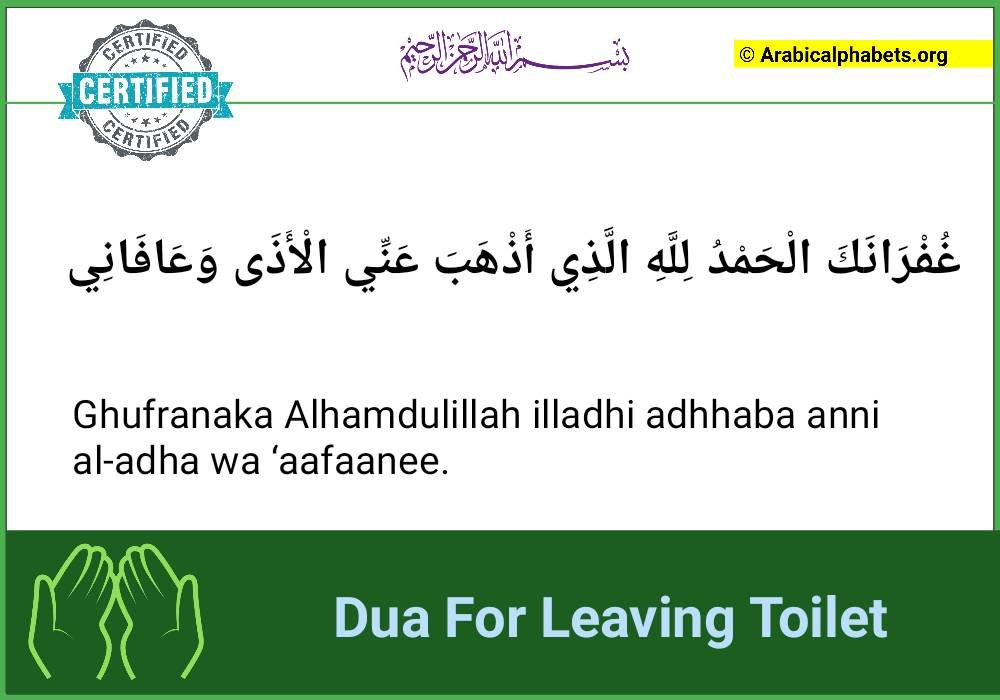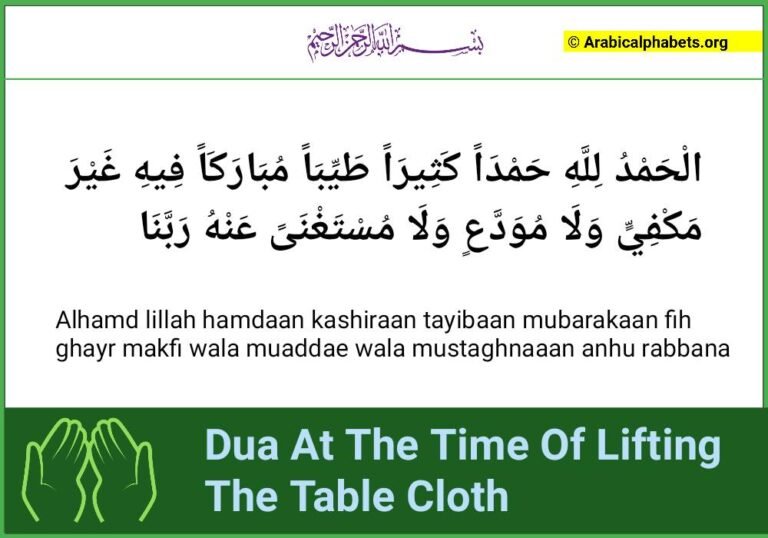Dua For Leaving Toilet Arabic & English Text With Translation
Looking for reliable Islamic content? Visit Arabicalphabets.org, an international platform offering accurate Arabic-English translations of Islamic texts, including Duas like Dua for Leaving the Toilet.
Perfect for UK Muslims seeking to deepen their faith. Start your journey with us today!
|
Table of Contents
hide
Dua For Leaving Toilet
|
When leaving the toilet, it is recommended to recite the following du‘ā’:
الْحَمْدُ لِلَّهِ الَّذِي أَذْهَبَ عَنِّي الْأَذى وَعَافانِي
All praise is for Allah who removed from me filth and granted me purity.
This dua can be recited in both Arabic and English. The English translation of the dua is as follows:
“All praise is for Allah who removed from my filth and granted me purity.
When you leave the toilet, it is recommended to say a specific du‘ā. This is because when relieving yourself, you are in a state of ritual impurity (najasah).
By saying this du‘ā, you are seeking forgiveness from Allah and asking for His protection.
The du‘ā is as follows:
الْحَمْدُ لِلَّهِ الَّذِي أَذْهَبَ عَنِّي الْأَذى وَعافانِي
All praise is due to Allah who removed from me the filth and granted me health.
When it comes to matters of personal hygiene, Muslims are very particular about cleanliness.
This is why there is a special dua or prayer, that is recited when leaving the toilet. The dua for leaving the toilet is said in both Arabic and English and its translation is as follows:
“O Allah, I seek Your forgiveness for all my sins. I ask You to cleanse me of all impurities and uncleanliness.
I praise You and thank You for giving me the strength and ability to perform this act of ablution.”
This dua reminds us of the importance of cleanliness in Islam. It also shows how grateful we should be to Allah for His blessings.
Dua For Leaving The Toilet: What You Need To Know
In Islam, leaving the toilet is accompanied by a recommended supplication (dua) that holds spiritual significance. This dua purifies oneself and rids the body or clothing of potential impurities.
Understanding the nuances of this dua can help foster a sense of cleanliness and mindfulness through Islamic teachings.
Here are key aspects to consider when reciting the dua upon leaving the toilet:
1. Ensure Complete Relief:
Before leaving the toilet, ensure you have fully relieved yourself, emptying your bladder and bowels.
This step is crucial, as the dua is meant to be recited when the act of relieving oneself is complete.
2. Thorough Handwashing:
Upon using the toilet, washing your hands thoroughly with soap and water is imperative.
This hygienic practice aligns with Islamic teachings on cleanliness and prepares you for reciting the dua.
3. Sincerity and Focus:
When reciting the dua, approach it with sincerity and focus.
Be present in the moment, fully engaging with the words you are about to utter. Sincerity enhances the spiritual connection that the dua establishes.
4. Repetition for Emphasis:
The recommended practice is to recite the dua three times.
Repetition reinforces the importance of the supplication and its meaning. Each recitation carries a weight of significance and serves to strengthen the spiritual impact.
The dua that is often recited upon leaving the toilet is as follows:
غُفْرَانَكَ
(Ghufranak)
“Your forgiveness”
This simple phrase acknowledges the need for forgiveness and seeks Allah’s pardon for any shortcomings in observing proper etiquette.
Uttering this dua upon leaving the toilet is a symbolic act of physical and spiritual purification.
By adhering to these considerations and reciting the dua with mindfulness, you embrace Islam’s holistic approach to cleanliness.
This practice extends beyond the physical realm, promoting a sense of inner purity and connection to the Divine.
Conclusion Points
My Opinion: Dua, known as Islamic supplication, is a major part of Muslim prayer.
Learning phonetic dua from a qualified Imam will help you recite duas for maximum effect.
Leaving the toilet can be seen as a metaphor for leaving the material world behind and moving towards the spiritual world.
The Dua for Leaving Toilet is a prayer that asks for Allah’s forgiveness and guidance as we move from one world to another.
It is a reminder that we are all sinners and need Allah’s help to find our way back to Him.
FAQs
What is the dua for leaving the toilet in Arabic and English?
Answer: The dua for leaving the toilet in Arabic is: الحمد لله الذي أذهب عني الأذى وعافاني (Alhamdulillahil-ladhi adhhaba ‘annil adha wa ‘afani). The translation in English is: All praise be to Allah who has relieved me of harm and granted me health.
Is there a specific time to recite this dua?
Answer: No, there is no specific time mentioned to recite this dua. It can be recited whenever you leave the toilet.
Can I say the dua silently, or must it be said out loud?
Answer: You can say the dua silently or quietly if you prefer, as there are no strict rules regarding its pronunciation.
Is it necessary to wash hands before reciting this dua?
Answer: Although washing hands after using the toilet is recommended in Islam, it is not a requirement specifically associated with reciting this dua.
Can non-Arabic speakers recite this dua?
Answer: Non-Arabic speakers can recite this dua by following the transliteration or using the provided English translation.
What are the benefits of reciting this dua?
Answer: Reciting this dua after using the toilet expresses gratitude to Allah for relieving oneself from harm and maintaining good health.
Can I recite any other supplications when leaving the toilet?
Answer: While other supplications leave the restroom, reciting this dua finance due to its mention in Islamic traditions.
Why do Muslims say a prayer when leaving the toilet?
Answer: Muslims pray when leaving the toilet to express gratitude towards Allah for granting them relief from harm and maintaining their well-being.
It also serves as a reminder of cleanliness and hygiene.






